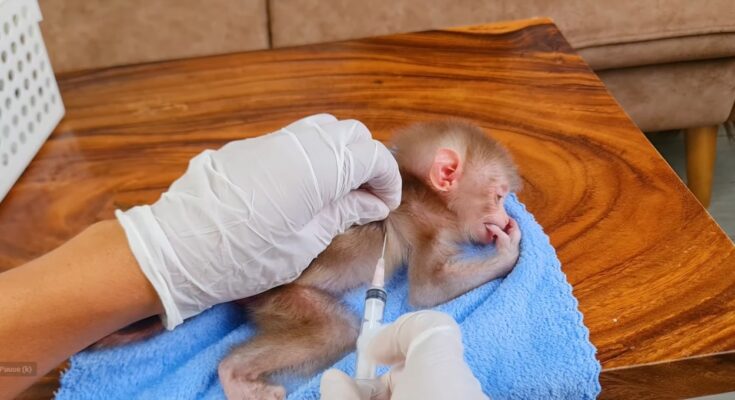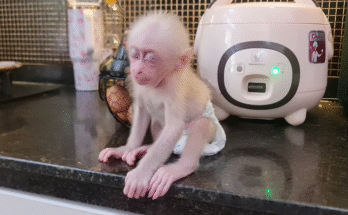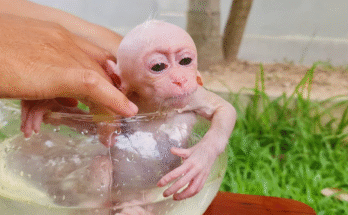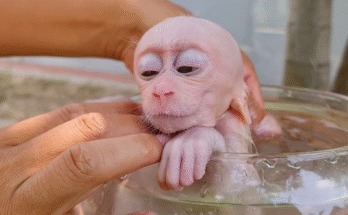A Father’s Care: The Journey of a Young Monkey
In the dense jungles of Southeast Asia, life thrives in a delicate balance. Among the towering trees and vibrant canopy, a story of survival unfolds—one of a young monkey, newly orphaned, and the father who steps up to raise him. This isn’t a common tale in the primate world, where mothers typically shoulder the burden of care. Yet, sometimes nature surprises us, and extraordinary bonds are formed in the face of adversity.
A New Beginning

The young monkey, named Kiki, was just a few weeks old when tragedy struck. His mother, a gentle and nurturing presence, fell victim to a predator’s ambush. In the aftermath, the troop’s hierarchy and dynamic shifted. Survival in the wild demanded constant vigilance, and orphaned infants rarely made it without their mothers. But Kiki’s father, Raju, defied instinct and tradition.
Most male monkeys are peripheral figures in their offspring’s lives, focused more on troop defense and mating. Yet, Raju had always been different. His quiet strength and attentive nature set him apart. When Kiki’s cries filled the forest, Raju was there, his powerful arms becoming a sanctuary.
The Challenges of Fatherhood
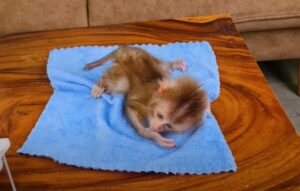
Raising a baby monkey is no simple task. Infant primates are highly dependent on their mothers for nourishment, warmth, and learning essential survival skills. Raju faced numerous challenges, starting with feeding. Without the natural milk Kiki’s mother would have provided, Raju had to rely on foraging. He began selecting the ripest fruits, tender leaves, and even insects, ensuring Kiki received the nutrition he needed.
Feeding wasn’t the only hurdle. Socialization within the troop was critical for Kiki’s development. Some members were skeptical, even hostile, toward Raju’s unconventional role. However, through subtle but firm displays of dominance and affection, Raju communicated that Kiki was under his protection. Slowly, the troop adapted, and Kiki found his place.
Lessons in the Canopy
Every day brought new lessons. Raju taught Kiki how to swing from branch to branch, judging distances and testing his grip. He demonstrated how to recognize danger—ears twitching at the slightest rustle, eyes scanning the underbrush. These skills were crucial; the forest was beautiful but merciless.
One afternoon, while the sun filtered through the leaves, Kiki had his first real test. Venturing a little too far, he found himself face-to-face with a snake. Panic set in, but Raju’s training took over. The young monkey froze, remembering the warning signals. Moments later, Raju was there, swiftly pulling Kiki to safety. It was a harrowing experience, but one that solidified the bond between them.
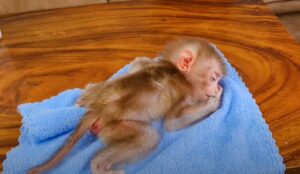
The Bond Grows Stronger
Their relationship deepened with each passing day. Kiki, once frail and uncertain, grew stronger. His fur thickened, his movements became more confident. Raju, too, changed. His role as a caregiver softened some of the edges forged by years of leading the troop. He became more patient, more attuned to the nuances of nurturing.
Other young monkeys began to watch Raju and Kiki, sometimes joining their play. In a subtle but significant shift, Raju’s actions began influencing the troop’s dynamics. The once rigid roles of male and female were blurred, replaced by a new understanding of family and support.
A Legacy of Care
As the seasons changed, so did Kiki. He grew into a spirited juvenile, capable of independence but always shadowed by the lessons his father imparted. The bond they shared was a testament to the resilience of family, one not defined solely by biology but by love and commitment.
Raju’s unconventional journey didn’t just save his son; it challenged the norms of his world. In the heart of the jungle, amid the struggle for survival, he showed that care knows no bounds, and fatherhood is more than just a title—it’s a promise.
